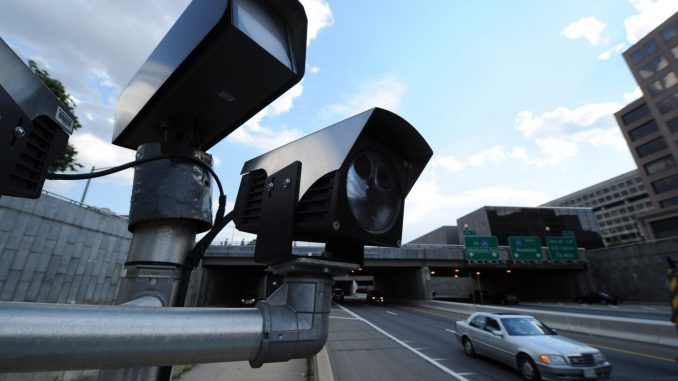
From The Washington Post: “In Washington, D.C., where issuing traffic citations is a $179 million-a-year business, drivers get speeding tickets for violations they don’t commit and for vehicles they’ve never owned.
Those are among the findings in a 115-page audit of the three city agencies that issued nearly 2.5 million parking and traffic tickets in fiscal 2013, according to a withering report issued Monday by the D.C. inspector general.
The report portrays the District as the Wild West of traffic enforcement when compared with neighboring jurisdictions and the states, with a shortage of regulations, a legion of ticket writers often confused about the rules, “arbitrary” decision-making about who gets some speed-camera tickets and parking-meter monitors who get called on the carpet if they don’t write enough tickets.

BYPASS THE CENSORS
Sign up to get unfiltered news delivered straight to your inbox.
You can unsubscribe any time. By subscribing you agree to our Terms of Use
The report will be closely read by anyone who has ever felt aggrieved about receiving a D.C. traffic or parking citation, and there will be many an exclamation of “I told you so.”
The comment of a certain “senior District official,” who is granted anonymity in the report, figures to be widely shared in conversation and on social media: “One of the beauties of parking, it’s like the [Internal Revenue Service]. If you get a parking ticket, you are guilty until you have proven yourself in nocent . . . . And that’s worked well for us.”
Two of the report’s most revealing details focus on the use of automated speed cameras and how tickets are handled when vehicle registration documents show a license plate and the car it’s attached to don’t match.
The District had 87 speed cameras, some of them fixed and others mobile, in January and is acquiring more. Many of the cameras are positioned on multilane streets, and when they snap a photo capturing more than one car, police department analysts have to decide who deserves the ticket.
Though the department’s manual uses multiple photos and an illustration to guide those decisions, the inspector general said reviewers often were inconsistent and arbitrary in deciding who received tickets.
One reviewer told the inspector general that the speeding vehicle is “usually the closer one” to the speed camera. The report said there was “a lack of precision and certainty [as to] which vehicle was speeding.”
“The reality is that the District often issues speeding tickets without conclusive identification of the violating vehicle,” the inspector general said.
The report also took issue with department guidance to reviewers when a license plate in a photograph is on a vehicle different from the one it is registered to. “The owner may have swapped tags. Those are ok to issue” [tickets], the manual says.
“The [inspector general] believes that [D.C. police] should discontinue this practice because it leads to the issuance of erroneous tickets,” the report says. “The [inspector general] frequently receives correspondence from out-of-state motorists insisting that their vehicle is not the violating vehicle. The motorist is then in a difficult and uninformed position of having to figure out and prove how the District or another jurisdiction erroneously linked his or her vehicle to the license plate in the violation image. The onus in these instances should be on the District — to make issued tickets irrefutable — not on vehicle owners to prove how the District erred when it issued the tickets.”
D.C. Police Chief Cathy L. Lanier called the report “flawed” and “sensationalist.” She said there is widespread support for the District’s use of automated speeding and red-light cameras.
“The goal is to modify driver behavior throughout the District so that pedestrians, bicyclists, and other motorists are safer while using the roadways,” Lanier said in a statement. “Having drivers moderate their speeds by just a few miles an hour increases pedestrian survival rates significantly.”
In addition to the police department (745,875 tickets in 2013), which operates the speed and red-light cameras, tickets also are issued by parking-meter minders from the Department of Public Works (1,731,861 tickets) and traffic-control officers from the District Department of Transportation (3,389 tickets).
“Ticket writing in Washington, D.C., proper has become a capricious, arbitrary and draconian money-making undertaking,” said John B. Townsend II of AAA Mid-Atlantic. “Unfortunately, it has also become a quarter-billion- dollar annual enterprise based upon 3 million tickets in the city that merely pays lip service to traffic safety.”
The inspector general faults those who write parking-meter tickets for frequently failing to also issue a “required” photograph that shows the violation. The report recommends that “any parking ticket for which the motorist is not given clear photographic evidence of the violation shall be dismissed.”
The report says DDOT’s traffic-control officers, most of whom work intersections at rush hour, raise a “significant concern” with their inconsistent ticketing practices. It recommends that DDOT issue clear guidance on when drivers can expect to be ticketed.
“Skeptical members of the public might believe that the District’s failure to inform them on this subject is intentional: without clear criteria of the District’s ticketing policy, a ticketed motorist is unable to prove that DDOT enforcement officers failed to follow proper procedure,” the report said.
The inspector general reviewed practices in the suburbs and elsewhere for comparison. The report said that nationwide, 502 communities had red-light camera programs and 136 had speed-camera programs.
“The [inspector general] concluded that the District’s enabling legislation is silent on a number of topics addressed in other jurisdictions, a condition that puts virtually no restrictions on the District’s burgeoning [automated traffic camera] program,” the report said. “For example, in some jurisdictions, there are specific limits on the number of cameras that may be installed. Elements of programs in other jurisdictions clearly emphasize safety as the primary objective.”
The report said other jurisdictions have addressed privacy issues raised by retention of photos from automatic cameras. It poses questions that are not answered by District law or regulation:
• Could these images and videos be requested by either the prosecution or the defense [in] a criminal investigation?
• Could insurance companies request access to specific images and videos to make determinations of insurability?
• Could someone request and be given access to these images and videos as part of a civil case, such as a divorce or child-custody proceeding?
• Could the District (or one of its contractors) be held liable in the event of a data-security breach that results in the public disclosure of images in which vehicles or pedestrians are easily identifiable?
Most of the Districts photo-enforcement equipment is maintained by the contractor, American Traffic Solutions, which receives a monthly fee of $3,192 for each red-light camera; $4,788 for each fixed or portable speed unit, and $6,385 for each mobile speed-enforcement camera.


